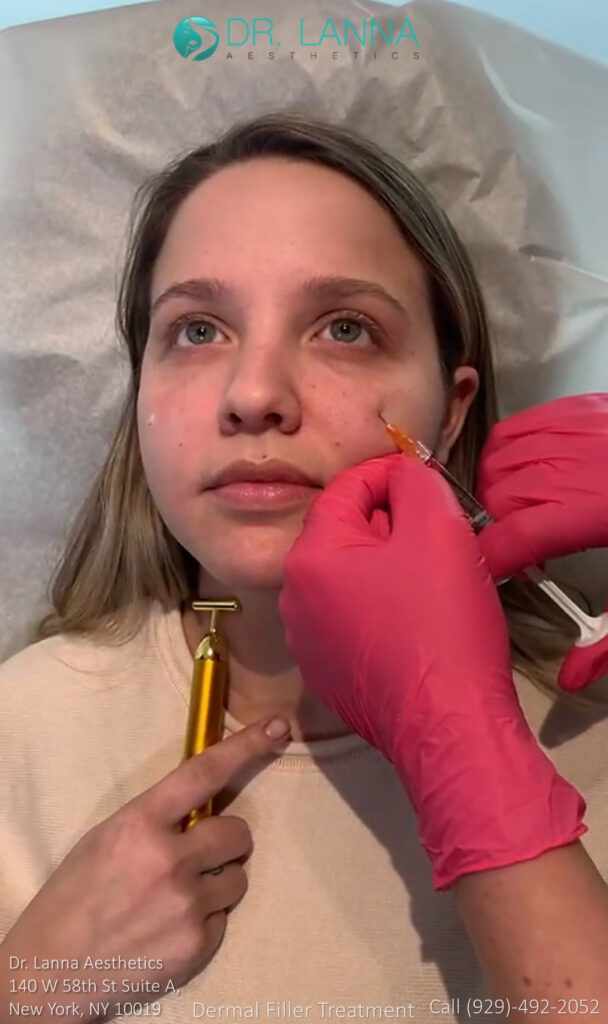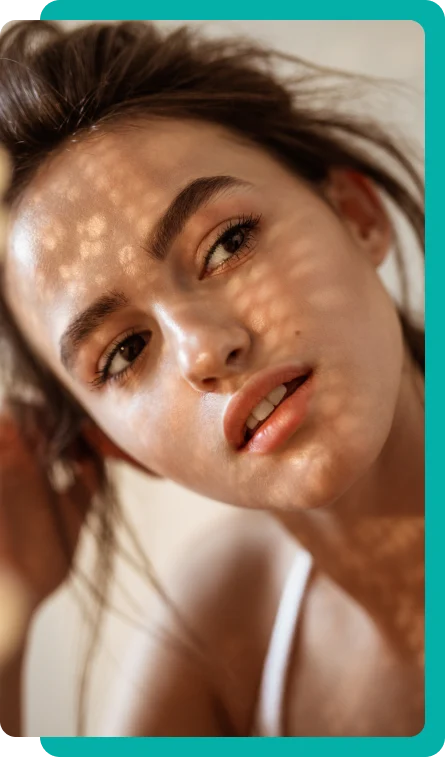For Patients
About
For Providers
Locations
Blog
Contact
Menu
The use of dermal fillers is gaining popularity among those seeking a non-surgical solution to reverse the effects of aging and reduce the appearance of deep wrinkles and fine lines around the nasolabial folds, hollows in the cheeks, and loose skin. However, it’s important to keep in mind that certain medications could interact with the healing process of your cheek filler treatment.
So what medication should patients avoid after receiving cheek fillers? Following the operation, patients are instructed not to take any medications for a week that may cause bleeding and swelling. These prescription medications may include antibiotics, herbal supplements, immunosuppressants, and blood thinners. For appropriate medical guidance, any medication a patient might be taking should be disclosed to their dermal filler provider in advance.
Many injectors will instruct patients to avoid taking some of the following prescription drugs and dietary supplements a week before their dermal filler session and to keep away from them for an additional 3 to 5 days following injectable treatment:
When compared with plastic surgery, cheek filler procedures are a fast and straightforward way to augment the cheeks. But you still have to keep in mind that there are a few medications you shouldn't take after the procedure. Consider avoiding the following additional medications to receive the best results with your new and improved cheeks.
If you take blood thinners like Coumadin (warfarin) or non-steroidal anti-inflammatory drugs, bleeding after the procedure may get worse. Stay away from unnecessary blood thinners. Several medications reduce the likelihood of blood clots. Aspirin, Advil (ibuprofen), and Aleve are some of widely used blood thinners among patients.
It’s recommended to stop taking blood thinners 7 days before and a day after your dermal filler session. Tylenol is a good option if a patient needs to take a painkiller prior or after the procedure. The medical necessity of blood thinners such as Coumadin or Plavix makes it unsafe to stop taking them. On the other hand, if you are taking blood thinners, you should be mindful of the elevated risk of bruising.
Fillers like Restylane, Juvederm, Radiesse, and Perlane are foreign bodies administered beneath the skin. A localized infection could develop if an infection already present in the body is absorbed in the filler. So patients shouldn't receive a filler injection if they're taking antibiotics and feeling quite sick. However, receiving an injection while taking a long-term antibiotic for acne is not a concern.
Inform your dermal filler provider in advance if you take any immunosuppressant medications, such as sulphasalazine, methotrexate, or gold injections. These medications weaken your immune system, increasing your risk of infection. Immunosuppressant medications are used to treat illnesses like psoriasis, multiple sclerosis, Crohn's disease, and rheumatoid arthritis.
Patients frequently overlook mentioning herbal supplements when questioned about medications by health professionals. Many may think that a certain supplement shouldn't pose any potential health risks since it is herbal or natural. It's crucial that you disclose anything you may be taking, including supplements and medications, if you decide to undergo dermal filler treatments.
Prior to having cosmetic injections, it may be harmful to take some supplements. The danger of bleeding during cosmetic treatment increases if you don't stop taking them in a timely manner. Supplements containing the following common herbs should be avoided before cosmetic procedures, as they can cause bleeding or bruising at the injection site:
Cheek Filler: What to Expect After Treatment
Facial fillers are an effective method to witness visible improvements in your appearance without having to get any surgical treatments or procedures done. If properly maintained, this injectable treatment can even last up to 2 years.
Even though injectable treatments, such as dermal filler and Botox injection procedures, are quick, relatively painless, and have a short recovery period, it is always helpful for patients to understand how these procedures perform before choosing them.
Some of these adverse effects are quite brief, and serious complications are uncommon. However, there are hazards associated with every cosmetic surgery and treatment procedure. Among the complications that may come with dermal fillers are:
Rarely, persons who have received injections of facial fillers experience eyesight issues. Seek immediate medical attention if you are experiencing vision issues combined with discomfort, weakness, or pain on one side of your body. It may be possible to avoid any adverse effects by maintaining and caring for the injectable treatment properly.
Each patient has a unique post-procedure experience. There could, however, inevitably be bruising and swelling after the procedure. Don't panic if you look a little purple and blue after the cosmetic treatment; some patients swell and bruise more than others. If you don't feel comfortable showing the bruises in public, try scheduling the dermal filler injection procedure before the weekend or take a day off.
The injected area sometimes experiences lumps and bumps. Over time, these lumps will become softer. Your licensed esthetician will have scheduled a follow-up visit a few weeks after the cosmetic injections to check the treated area and make sure everything is healing and looking great. You can discuss any issues and ask any questions you may have regarding your recovery during this appointment.
Self-care is crucial after dermal filler procedures. Your cosmetic injector or plastic surgeon will provide you with aftercare instructions, including advice on how to manage pain, treat the injected area, and clean it. In general, it's important to keep the treatment area of skin clean, stay away from heat and high temperatures, resist touching or rubbing the affected area of skin, and get medical help if you encounter any unusual side effects.
Here are some additional care instructions to prevent bruising and bleeding following your dermal filler injection procedure:
Additionally, patients can quickly reduce the appearance of swelling and prevent bruising by decreasing blood flow to the treatment area. Regularly apply a cold compress to the injected site for 15 minutes, three to four times per day for one to two days after your procedure. To properly incorporate this into your dermal filler recovery care instructions, patients are advised to wrap an ice pack in a small towel or soak a washcloth in cold water.
We will discuss your current health condition during your initial consultation at the clinic, in addition to your desired goals. When we determine dermal fillers are the best treatment for you, we will let you know more about how they work and what you can anticipate from your session.
Due to the minimally invasive nature of this procedure, you won't have to significantly change your routine before or after your appointments. Nonetheless, you should keep a few things in mind to ensure your safety and the effectiveness of the procedure.
A medical professional will conduct a consultation with the patient before administering dermal fillers. You might want to consult a dermatologist, a doctor who focuses on treating skin conditions. They will look at your face and inquire about your objectives and problem areas.
They could mark your face with a pen or marker to indicate where the injections will be. They might also photograph your face. Your doctor will discuss potential adverse effects and recovery times before recommending a particular filler or fillers.
Inquiries regarding your medical background will be made by your healthcare professional during the consultation. When getting fillers, you should tell your cosmetic injector or plastic surgeon if you are currently taking any medications, since some drugs increase the risk of complications.
Generally, dermal fillers are considered a good option for most adults aged 22 and older, but an ideal candidate would need minimal permanent work done, does not smoke, and is in good general health. Smokers experience slower healing periods. Because of this, dermal fillers work better over the long run on non-smokers.
If you're thinking about getting dermal filler treatments, you should be prepared to acknowledge the possibility that more than one procedure may be required to get the results you want. Additionally, it's essential to understand that dermal fillers only serve to temporarily enhance your appearance. Dermal fillers work just as well on both men and women. When it comes to treating just one particular area of the face, fillers are also quite effective.
The following issues may also be present in ideal dermal filler candidates:

Dermal fillers are an excellent way to get the desired aesthetic results if you're wary of having plastic surgery or just want to minimize recovery time. Although simple and efficient, this procedure has the potential to induce inflammation, pain, and redness. Whether it be cheek filler or lip filler treatment, people who must continue taking specific medications and supplements for several days after getting facial fillers may not be a good candidate.
At Dr. Lanna Aesthetics, you will experience top-of-the-line cosmetic procedures including dermal filler injection and Botox injection treatments. Our procedures are performed by skilled injectors and experienced aestheticians to deliver the results you desire. We have successfully completed over 10,000 cosmetic treatments, demonstrating our expertise in the field of aesthetics. Call us at (929) 565-7539 to learn more about the benefits of receiving dermal fillers.

Join Dr. Lanna & Dr. Doshi for a Transformation
Unlock the possibilities with our certified facial and oculofacial plastic surgeries. Attend our free webinar to find out how we can tailor solutions for you, with financing available to fit your budget.
